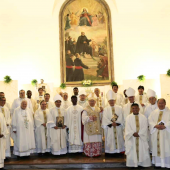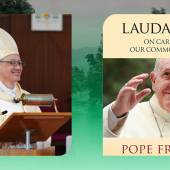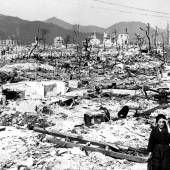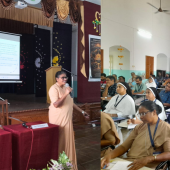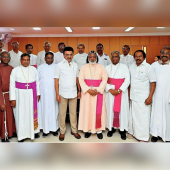Japanese bishops mark the 80th anniversary of the Battle of Okinawa
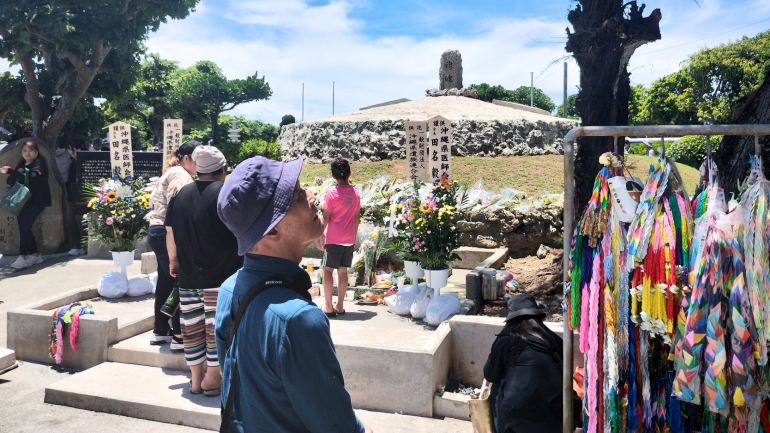
On June 23, fifteen bishops joined hundreds of people, including priests, nuns, and others from various walks of life, marking the 80th year since the war in the Battle of Okinawa, Japan.
The bishops, including two cardinals (Tarcisio Isao Kikuchi, SVD, archbishop of Tokyo, and Thomas Aquinas Manyo Maeda, archbishop of Osaka-Takamatsu), gathered in Okinawa to pray for peace at Otaru Church and then had a peace march to the Okinawa memorial site.
“I prayed for a world with a culture of care and walked hoping for a society where people take people for granted,” said Divine Word Bishop Paul Daisuke Narui of Niigata.
The Peace March was organized by the Diocese of Naha and the bishops of Japan.
Cardinal Kikuchi, archbishop of Tokyo, led the peace Mass at Otaru Church at 6:00 in the morning, followed by a peace march to the Tamashi Tower.
In his message, Kikuchi emphasized the importance of reminding Okinawans of their tragic history and its ongoing impact.
In today’s time, it is everyone’s responsibility to preserve and transmit the lessons of Okinawans and reality to future generations amid the growing number of international conflicts and nuclear threats.
Several Catholics, priests, and nuns, including Mr. Hiroki Maeda, gathered to pray for peace.
Okinawa, a prefecture in southwest Japan, also held a memorial service to honor those who lost their lives in intense ground combat at the close of World War Two eight decades ago.
The Battle of Okinawa claimed the lives of over 200,000 people, including about one in four of the prefecture's population at the time.
On June 23, 1945, Japan's now-defunct Imperial military put an end to organized combat against US forces in the battle, according to Okinawa Prefecture. Every year on this day, the final fierce battleground, Peace Memorial Park in the city of Itoman, hosts the memorial service.
Survivors' stories have passed down accounts of the Battle of Okinawa from one generation to the next. However, there aren't many opportunities for people to hear them directly these days. Some are even questioning the accuracy of certain historical accounts.
Considering this, attempts are being made to inform the public about the true nature of the incident. Among them is the use of tangible artifacts from the conflict, such as the Japanese military's headquarters beneath Shuri Castle. Adding digital resources to peace education is another initiative.
Approximately 70% of the US military installations in Japan are still located in Okinawa. Investigative authorities suspected a record number of people connected to the US military of committing crimes in the prefecture last year.
The prefecture's responsibility and role in maintaining Japan's security are only increasing. The defense of the southwestern islands, including Okinawa, is being strengthened by the central government.
Radio Veritas Asia (RVA), a media platform of the Catholic Church, aims to share Christ. RVA started in 1969 as a continental Catholic radio station to serve Asian countries in their respective local language, thus earning the tag “the Voice of Asian Christianity.” Responding to the emerging context, RVA embraced media platforms to connect with the global Asian audience via its 21 language websites and various social media platforms.









